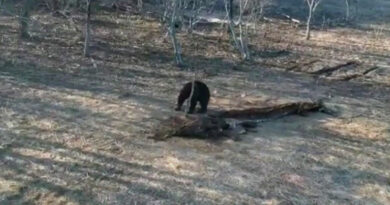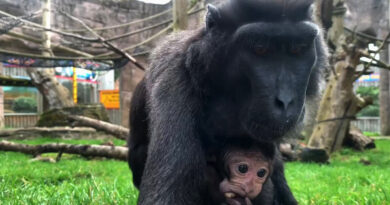Rare Bears Rescued From 17 Years In Dark Basement
This footage shows two endangered bears being rescued from dark basement cages in Vietnam where one of them was kept for 17 years and their bile was harvested to be used in traditional medicine.
The two bears, Xuan and Mo, are in such poor health that it is unclear if they will ever recover or if they will be able to socialise with other bears, according to a spokesperson for animal rights organisation Four Paws.
Katharina Braun told Real Press in an exclusive interview that despite these Asian black bears (Ursus thibetanus) being listed as threatened on the IUCN’s Red List of Endangered Species, the owners, who have not been named, will not be prosecuted because keeping bears is still legal in Vietnam.
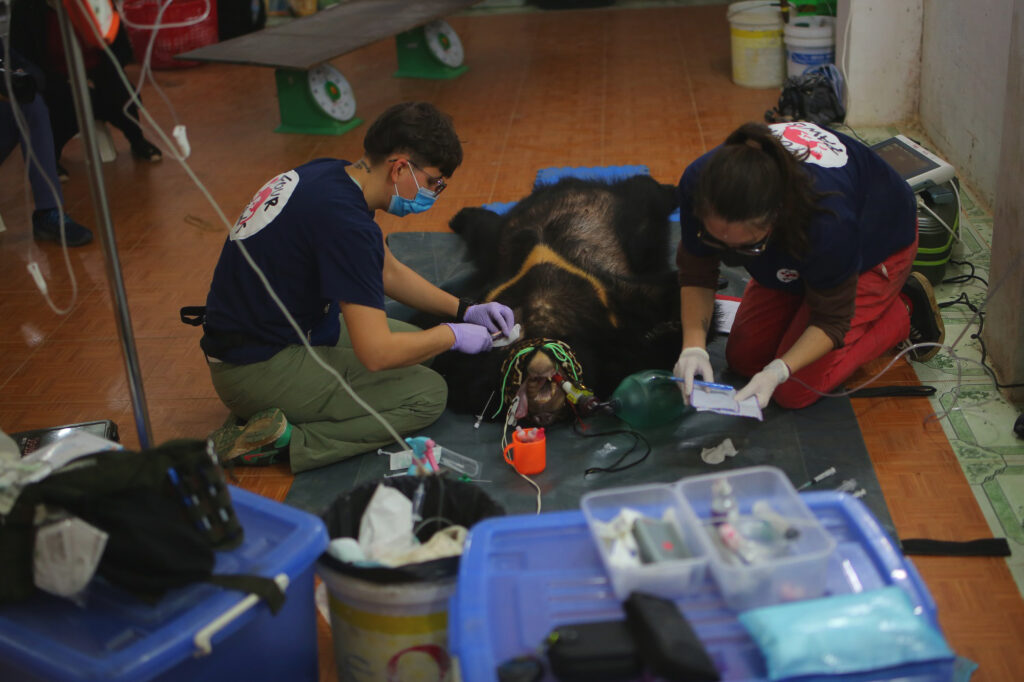
The only reason that they were able to remove the bears from their dark basement prisons underneath a clothing shop, was because their bile was being harvested to be used in traditional medicine, a practice that has been banned.
Braun said: “The keeping of bears is still legal in Vietnam. The country only has minimum requirements for the keeping of bears.
“Even if the keeping conditions do not align with those requirements, it is unlikely that the authorities would act. Every animal that is placed in species-appropriate care like ours is a big success already.”
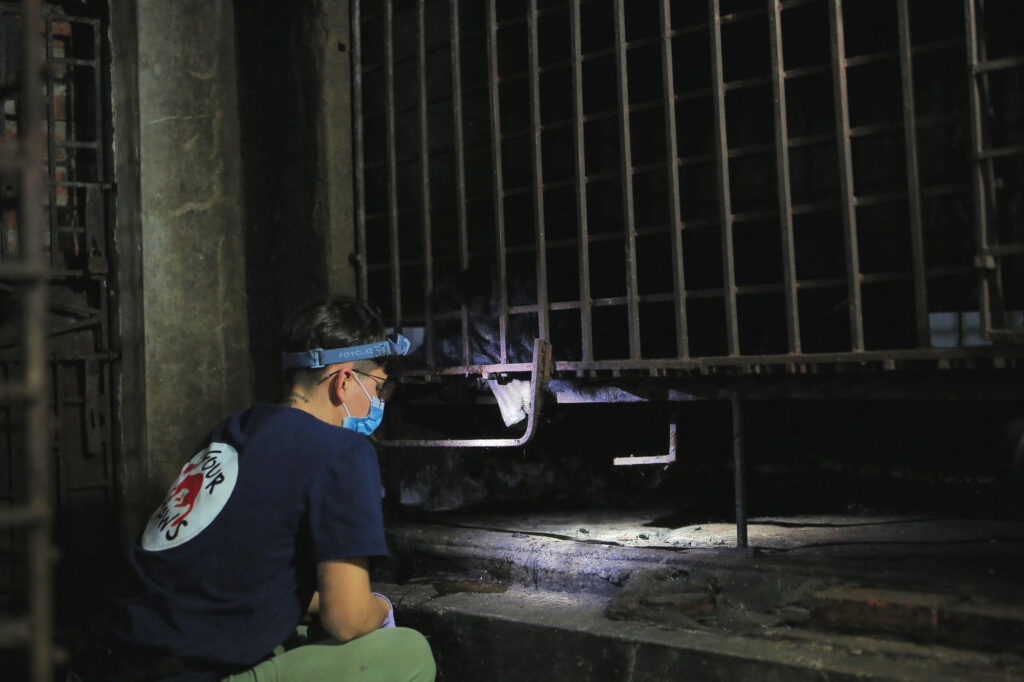
Xuan and Mo were rescued in Son La province, in north-western Vietnam, on 23rd March, and according to Braun, they only ever saw artificial light, and only when they were being fed.
Xuan, a male, was allegedly kept in the cage since 2004 when he was but a cub. It is unclear how long the female, Mo, was held captive in the basement, but it is believed to have been years too.
Four Paws say that 372 bears in Vietnam are “still suffering in cruel conditions on bear farms or in private keeping.” The organisation said that the team that rescued the bears, while experienced, were left “speechless by the cruelty they encountered”.
In a statement obtained by Real Press, the organisation also said: “Their rusty cages were small and dirty, and there was no access to fresh air and poor ventilation in the windowless basement. Both bears were medically checked and cleared for the 9-hour return journey to the Ninh Binh Bear Sanctuary, run by FOUR PAWS. Xuan and Mo will now receive all the care they need to recover from the ordeal they had to suffer.”
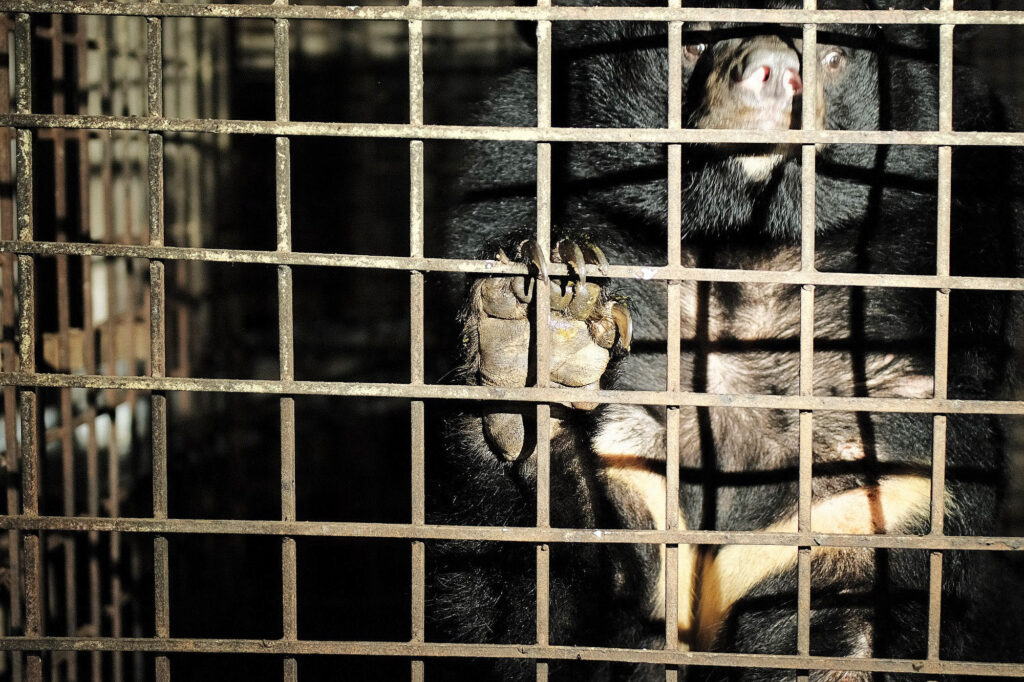
The sanctuary is home to some 40 Asiatic black bears, all of which were “not only victims of cruel bile farming prior to their rescue, but also of illegal wildlife trafficking.”
Braun explained that “bear bile is used in traditional medicine but also in cosmetic products.” She said that the “reasons for this are tradition and conviction that bear bile can have particularly positive healing effects. Used to fight fever, for detoxification, against inflammation, swelling and to reduce pain. The active ingredient with medicinal value in bear bile is ursodeoxycholic acid (UDCA). Since the 1950s, the substance UDCA can be replaced by herbal and synthetic alternatives.
“For the animals, this means a life of agony and in many cases, unfortunately, ends with the death of the bears on bear farms.
“Vietnam has a history of cruel keeping of bears but is one of the countries in Asia to take firm legislative steps against the keeping of bears to extract bile.”
She added that “in 2005, the government launched a campaign to phase out bear farming in Vietnam through attrition. All captive bears were registered and microchipped as part of an effort to ensure that no new bears enter farms. However, registered bears are in the care of bear farmers until they can be transferred to authorities or die.
“If there had been only 10 bears in captivity in 2005, all of them would have been confiscated. It was the number of captive bears on farms that prevented the government from exercising the law to address the problem. However, it is true that the attitude of government and society was that bear bile is useful and that although the law prohibits its sale, this law was ignored because it did not reflect social attitudes and norms.”
Braun explained that since 2006, “it is forbidden by law in Vietnam to hunt, trap, possess, kill, sell, or advertise bear or bear products.
“Although it is not forbidden to possess a bear if the bear has been registered and has been privately owned prior to the mandatory registration process introduced by the government in 2005.”
Speaking about whether or not the two bears will be able to integrate and socialise with the other bears at the sanctuary, Braun said: “Xuan and Mo lived in the basement together, but they were kept in separate cages and therefore might not know what it is like to spend time or play with another bear. Our team will carefully monitor them over the upcoming weeks and months to evaluate whether they can be socialised with other bears.
“From our experience with other bears we’ve rescued, this often works well, but of course depends on the individual personalities of the bears. If animals are socialised, it always happens under the safest possible circumstances.”
Speaking about what could be done to save the 372 other captive, endangered bears in Vietnam, Braun said: “The government must be made more accountable for phasing out bile bear farming, as decided in 2005.
“There are still farmers, especially in Hanoi, which remains a hotspot of bear keeping in the country, who vehemently refuse to give up their animals, and one can only assume that they are still abusing their animals and trading the bile.
“This must end and the government must act and deliver on its promise. We are putting pressure on them via our work on-site at BEAR SANCTUARY Ninh Binh, petitions and lobbying/talks on-site, and we are of course supporting them to provide a species-appropriate home to as many suffering bears as possible.”
In the meantime, Xuan and Mo are being closely watched in their new home. Braun said: “They are for now in a quarantine area to prevent any potential disease transfer between them and our resident bears. During this time, they receive intensive medical care, are gradually adjusted to a new healthy diet, and are monitored closely by our caretaker team.
“Mo and Xuan have lived in an environment with zero possibility for physical and mental stimulation whatsoever, therefore they are still a bit stressed and not used to natural light and different sounds they didn’t know before. They are very reactive to any noise and other stimuli even though they are kept in a quiet area of the sanctuary – it will take some time for them to get used to the new surroundings.
“Both of them have some health issues, especially gallbladder disease from repeated bile extraction, and Xuan is also overweight, has liver disease and his teeth are in terrible condition. Once they have calmed down and settled in, our team will perform thorough medical checks on them. We will take their steps of rehabilitation slowly and gradually and cater to their individual needs separately.”


